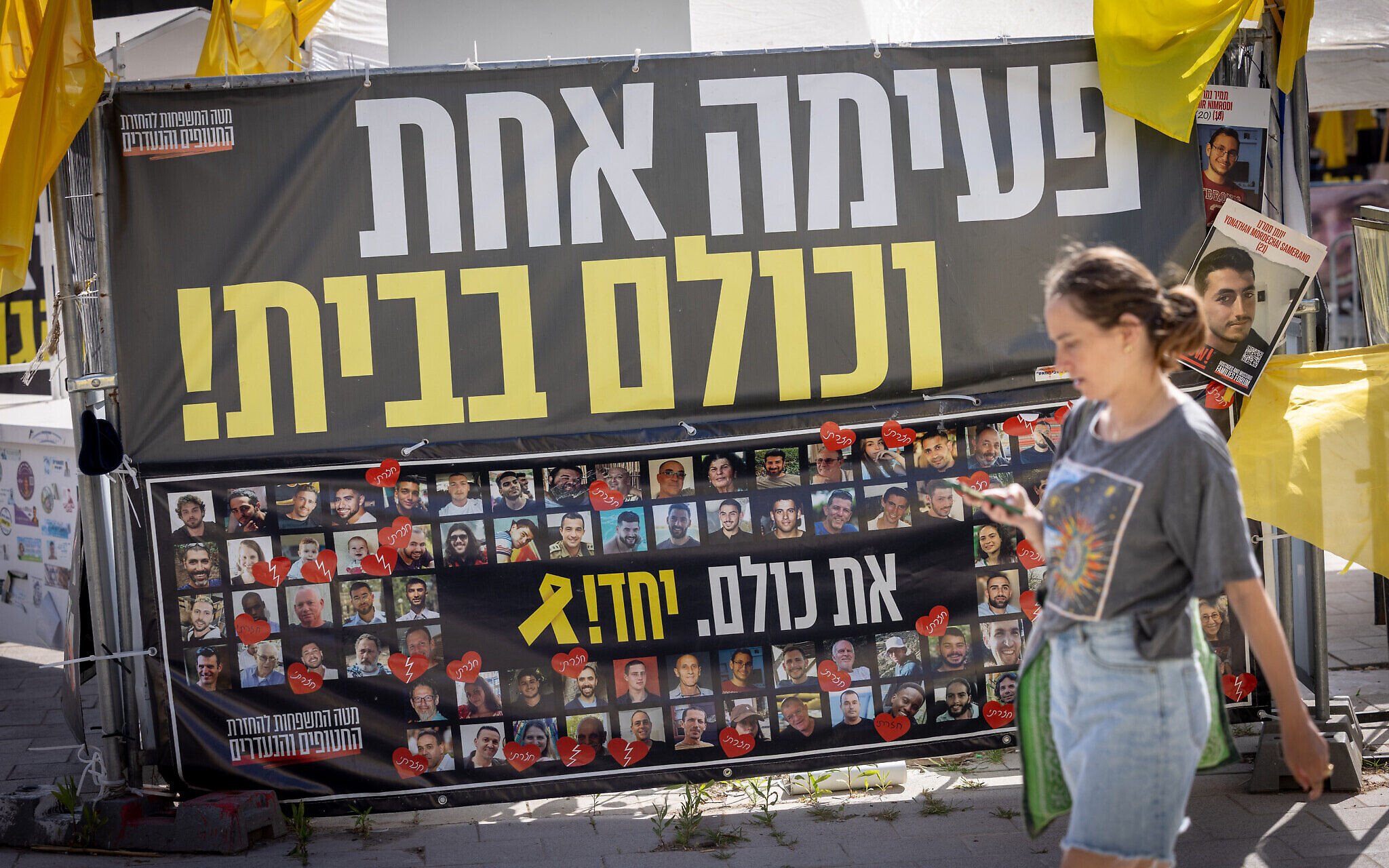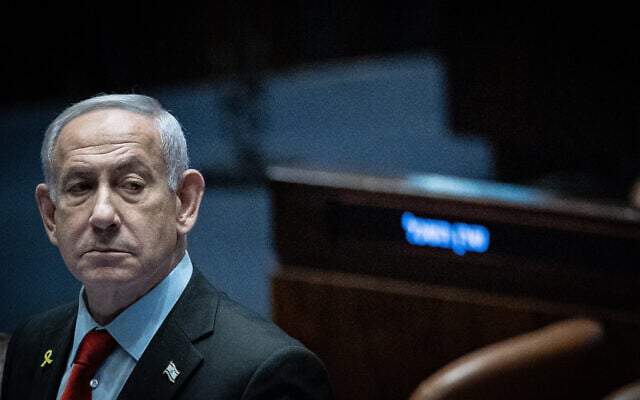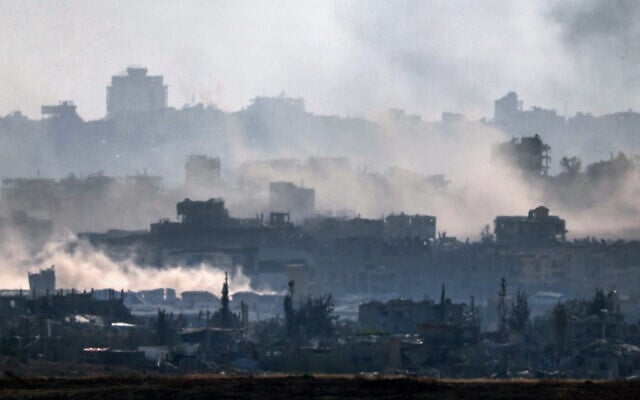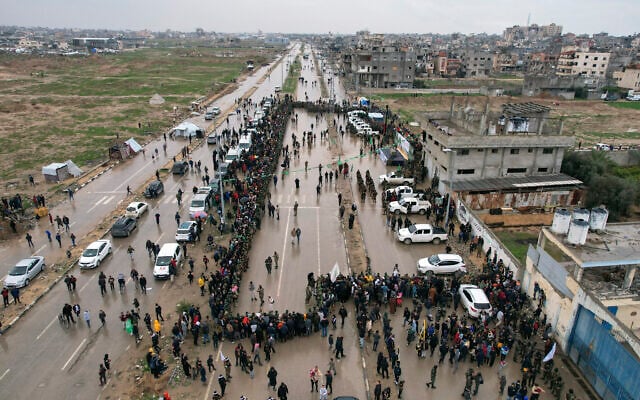



Prime Minister Benjamin Netanyahu told hostages’ families that he principally approves of US special envoy Steve Witkoff’s latest proposal for a temporary ceasefire and hostage deal in Gaza, media outlets reported Thursday, while two sources told The Times of Israel that Hamas is leaning toward accepting the deal, with some reservations.
However, the deal has not been finalized yet. An Israeli official speaking to The Times of Israel dismissed an Al Arabiya report that claimed an agreement had already been reached. Hamas’s Al Aqsa TV channel also denied the report, saying that the terror group was still reviewing the US proposal.
Citing unnamed sources, Al Arabiya had said that US President Donald Trump would announce a deal later on Thursday.
According to a copy of Witkoff’s latest proposal, the authenticity of which was confirmed to The Times of Israel by two sources familiar with the negotiations, Hamas would release 10 living Israeli hostages held in Gaza and return the bodies of 18 deceased hostages during a 60-day ceasefire, an Israeli official confirmed to The Times of Israel.
In return, Israel would release 125 Palestinian terror convicts serving life sentences, 1,111 Gazans detained since the start of the war on October 7, 2023, and 180 bodies of Palestinians currently held by Israel.
The IDF will also pull back from some areas where troops are currently deployed, the parameters of which will be finalized “during proximity negotiations.”
Netanyahu told hostages’ families during a meeting on Thursday that he was prepared to move forward with the proposal, the Axios news site reported, while Channel 12 reported that he told the families he “principally accepts” the document.
The prime minister’s support came even as right-wing ministers and some hawkish hostage families came out in opposition to the proposed deal, arguing that Hamas was weakened and that now was the time to pile on pressure on the terrorist organization to surrender.
White House spokeswoman Karoline Leavitt said Thursday that Israel had signed off on the proposal before it was sent to Hamas, appearing to refer to the meeting Witkoff held on Tuesday with visiting Strategic Affairs Minister Ron Dermer, in which the two went over the latest US offer.
“I can also confirm that those discussions are continuing, and we hope that a ceasefire in Gaza will take place so we can return all of the hostages home,” Leavitt said at a briefing.
Asked if Hamas had accepted the proposal, she responded, “Not to my knowledge.”
Hamas official Bassem Naim said in a statement that Witkoff’s proposal “does not respond to any of our people’s demands.” However, he said Hamas leaders were still studying the document.
The proposal effectively means “perpetuating the occupation and continuing the killing and famine — even during the temporary truce period,” Naim said.
An Arab diplomat and a second source familiar with the negotiations said Hamas will likely accept the offer in principle but will submit a series of reservations. Hamas is disappointed with the proposal and feels that Witkoff made crucial changes after conferring with Dermer in Washington, the second source told The Times of Israel. Still, it doesn’t want to outright reject the US proposal, fearing it would then be blamed for a lack of agreement.
Hamas wants a clause added to the proposal requiring Israeli forces to withdraw to the lines they held at the end of the previous ceasefire in March, along with a clause stipulating that aid will be distributed according to international humanitarian standards, the two sources said.
This appears to be an attempt to undercut Israel’s reliance on the new operations of the US- and Israel-backed Gaza Humanitarian Foundation, which international organizations have argued fails to adequately address the humanitarian crisis.
The latest hostage deal proposal does not delineate where IDF forces would redeploy once it comes into effect, a senior Israeli official said. Hamas has demanded that Israeli forces eventually be fully withdrawn from the Strip.
The method in which aid will be distributed under the agreement is unclear, with one Israeli official saying earlier that the United Nations would resume providing aid during a ceasefire instead of the GHF, while another Israeli official said that the terms do not dictate “the manner in which aid would be distributed within the framework of a ceasefire.”
Most critically, Hamas wants a clause regarding talks on a permanent ceasefire, which the deal envisions taking place during an initial 60-day truce — edited to more clearly prevent Israel from restarting the war, the Arab diplomat and second source said.
Negotiations are likely to drag out for at least several more days, as Israel and the US will have to respond to Hamas’s expected reservations, the Arab diplomat said.
Citing a source familiar with the talks, Axios reported that Hamas is also disappointed with the proposal because it does not include a clear US guarantee that the temporary truce it outlines will lead to a permanent ceasefire.
Hamas is seeking a proposal that ensures this, given that in the previous deal signed in January, Israel refused to hold negotiations on the terms of a permanent ceasefire, and resumed fighting in Gaza after the temporary truce expired.
According to Channel 12, one of the clauses may help address that matter.
Clause 10 of the accord, as confirmed to The Times of Israel, indeed, states: “The negotiation on the necessary arrangements for a permanent ceasefire should be completed within 60 days. Upon agreement, the remaining hostages (living and deceased) from the “list of 58” provided by Israel will be released.”
The same clause goes on to say, however: “In case negotiations on arrangement for a permanent ceasefire are not concluded within the aforementioned time period, the temporary ceasefire may be extended under conditions and for a duration to be agreed upon by the parties so long as the parties are negotiating in good faith.”
Clause 11 elaborates on the point, as regards ongoing guarantees: “The mediators-guarantors (US, Egypt, Qatar) will guarantee that the ceasefire will continue for the 60-day period and for any agreed upon extension, will guarantee that serious discussions will be held on the necessary agreements for a permanent ceasefire and will make every effort to ensure the completion of the above-mentioned negotiations.”
Hostages held by terror groups in Gaza include 57 of the 251 abducted on October 7, 2023, and the body of a soldier held by Hamas since 2014.
They include the bodies of at least 35 confirmed dead by the IDF, and 20 are believed to be alive. There are grave concerns for the well-being of three others, Israeli officials have said.
Agencies and Times of Israel staff contributed to this report.



